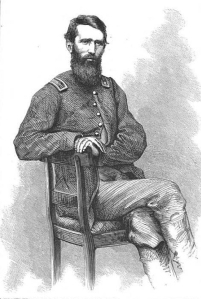Southern mountain people think for themselves, so when Tennessee voted to secede from the Union in 1861, the mountain folk of East Tennessee were “agin’ it.” They had little to gain from secession and much to lose, since this border region was likely to become a battleground between North and South.
So a group of dissenters met at the Greene County Court House and petitioned the legislature to let them become a separate state, which would remain with the Union. Their request was denied, and additional rebel troops were billeted in the region to keep an eye on them.
 But that did not silence them. Greeneville’s Andrew Johnson was the only Senator from a Confederate state who continued to serve in the U.S. Congress. (President Lincoln rewarded his loyalty by making Johnson the military governor of Tennessee when it fell to Union forces in 1862. He then chose Johnson as his vice-presidential running mate in 1864.)
But that did not silence them. Greeneville’s Andrew Johnson was the only Senator from a Confederate state who continued to serve in the U.S. Congress. (President Lincoln rewarded his loyalty by making Johnson the military governor of Tennessee when it fell to Union forces in 1862. He then chose Johnson as his vice-presidential running mate in 1864.)
Military skirmishes continued in Tennessee throughout the war. During a clash on September 4, 1864, a cannonball lodged in the front wall of the Cumberland Presbyterian Church, corner of Main and Church Streets in Greeneville. There it remains, just as East Tennesseans remained a chink in the wall of the Confederacy.

